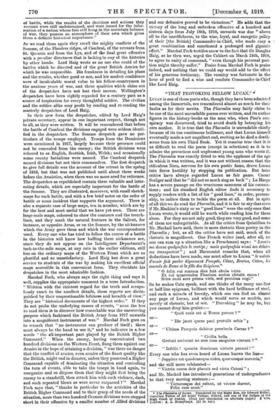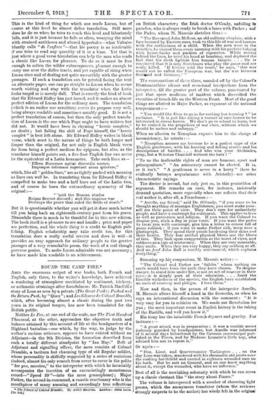"THAT PROVOKING FELLOW LUC.AN."
•
Lteeze is one of those poets who, though they have been admitted among the Immortals, are remembered almost as much for their faults as for their merits. The Pharsalia may fairly claim to be one of the most unreadable poems ever written, and its author figures in the history-books as the man who, when Piso's con- spiracy was discovered, tried to avoid death by betraying his own mother. It is true that the Pharsalia is unreadable chiefly because of its too continuous brilliance, and that Lucan himself eventually made a not ungallant end, reciting as he died a death- scene from his own Third Book. Yet it remains true that it is as difficult to read the poem (except in selections) as it is to admire the precocious and unpleasant young man who wrote it. The Pharsalia was exactly fitted to win the applause of the age in which it was written, and it was not without reason that the ridiculous Nero, nervous for his own poetic fame, drove Lucan
into fierce hostility by stopping its publication. But later critics have always regarded Luean as fair game. Caesar
Scaliger said that he " did not so much sing as bark " ; La Harpe has a severe passage on the wearisome sameness of his corusca- tions ; and his standard English editor finds it necessary to supply readers with a list of his " good lines," in order, presum- ably, to induce them to tackle the poem at all. But in spite of all this we do read the Pharsalia, and it is fair to say that even if Mr Haskins's sixty or so "good lines" were the only ones that Lucan wrote, it would still be worth while reading him for them alone. For they are not only good, they are very good, and some of them are unforgettable. As all the critics from Quintilian to Mr. Mack& hate said, there is more rhetoric than poetry in the Pharsalia; but, as all the critics have not said, much of the rhetoric is magnificent. One French writer (and, after all, no one can sum up a situation like a Frenchman) says : " Luatin ins donne quelguefois is vertige ; mais guelquefois aussi sex eclairs me transporten ; and M.armontel remarks that, when all deductions have been made, one must allow to Lucan " le merite d'avoir fait parler dignement Pompee, Cesar, Brutus, Caton, les consuls de Rome et la firle des Scipions."
" 0 felix cui summa dies fuit obvia via,"
Et cui quaerendos Pharium scelus obtulit enses ! Scire mori sons prima viris, sed proxima cogi."
So he makes Cato speak, and one thinks of the many one-line or half-line epigrams, brilliant with the hard brilliance of steel, and each a miracle of brevity, which one can find on almost any page of Lucan, and which would serve as models, not merely of rhetoric, but of wit. " Provoking " he may be, but you cannot deny him genius :- " Quid satis est si Roma parum ? "
" Ille facet quern pad protulit orbis " ; " Ultima Pompeio dabitur provincia Caesar ? "
" Civilia bella Gesturi metuunt ne non cum sanguine vincant ? "
Or—
" Lafelix ! quanta dominum virtute parasti " Every one who has even heard of Lucas knows the line- " Juppiter est quodcumque vides, quocumque moveris," and the still more celebrated-
" Victrix causa deis placuit sed vieta Catoni " ;
and Mr. Mackail has introduced generations of undergraduates
to that very moving sentence:
" Vieturosque dei celant, ut vivere durent, Felix esse mori."
• The Phan:alio of Lucan. Translated by the Right Hon. Sir Edward Ridley, sometime Fellow of All Souls' College, Oxford, and one of the Judges of the High Court of Justice. (Text and translation on alternate pages.) 2 yob, London: A. L. Humphreys. 1£2 net.] Or— or— or—
This is the kind of thing for which one reads Lucan, but of course at this level he almost defies translation. Still more does he do so when he tries to reach this level and laboriously fails, and it is just because he fails so often, wearying the mind with strained antitheses and absurd hyperboles—what Voltaire bluntly calls " de 'enflure " —that his poetry is so intolerable if one tries to read any quantity of it at a time. Yet that is just where a good verse translation can help the man who reads a classic like Lucan for pleasure. To do so it must be free enough to soften the wilder extravagances, pleasant enough to carry one over the duller tracts, and yet capable of rising when Lucan rises and of dealing not quite unworthily with the greater passages. If such a translation can be printed facing the text on alternate pages, one can go straight to Lucan when he seems worth visiting and stay with the translator when the Latin looks turgid or is merely dull. That is exactly the kind of book that Sir Edward Ridley has just issued, and it makes an almost perfect edition of Lucan for the ordinary man. The translation (which is an earlier one rewritten) serves its purpose very well, being always readable and sometimes notably good. It is not a perfect translation of course, but then the only perfect transla- tion of Lucan is the one which Pope ought to have written but did not. It would have been in rhyming " heroic couplets," no doubt ; but failing the skill of Pope himself, the " heroic couplet " is best left alone. Sir Edward Ridley writes in blank verse, which must in the nature of things be both longer and limper than the original, for not only is English blank verse far from being a perfect medium for epigram, but also, as the translator himself points out, a five-foot English line can never
be the equivalent of a Latin hexameter. Take such lines as- " Vlore Romanos agitat discortlia manes, Impiaque infernam ruperunt arms quietem,"
which, like all " golden lines," are as tightly packed with meaning as lines can well be. In translating them Sir Edward Ridley is compelled to make two and a half lines out of the Latin two, and of course he loses the extraordinary symmetry of the original :— " 'mid the Roman shades
Reigns fiercest discord ; and this impious war
Destroys the peace that ruled the fields of death."
But it is questionable whether you will get it done much better till you bring back an eighteenth-century poet from his grave.
Meanwhile there is much to be thankful for in this new edition. The book itself is a pleasure to see and handle ; print and paper are perfection, and the whole thing is a credit to English pub- lishing. English scholarship may take credit too, for this translation does a really useful service and does it well—it provides an easy approach for ordinary people to the greater passages of a very remarkable poem, the work of a real though perverse genius. To make Lucan admirable was not necessary ; to have made him readable is an achievement.















































 Previous page
Previous page